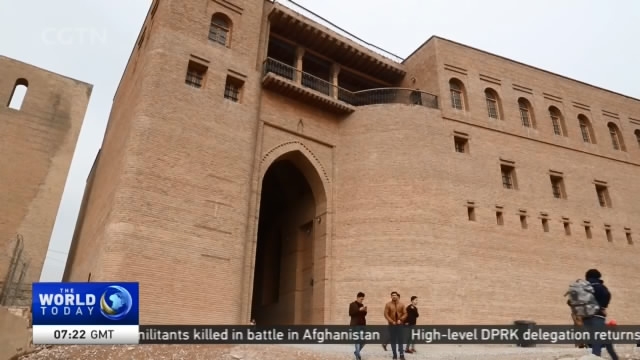
16:01, 27-Feb-2018
Iraq in Recovery: Exploring Kurdish identity inside Erbil Citadel

Tensions have been running high between Baghdad and the region of Kurdistan, after last September's controversial non-binding referendum on independence. In a recent move, the Iraqi federal government has extended by three months, a ban on international flights to and from the Kurdish region. In the last part of our Iraq in Recovery series, CGTN reporter Meng Qingsheng takes us inside the ancient Erbil Citadel, the capital of Iraqi Kurdistan.
The ancient citadel, a fortress high up on a mound overlooking the city, the Crown of Erbil. It's where many historic civilizations and their people have come and gone, including Babylonians and Assyrians.
The Citadel is located in the capital of Iraq's Kurdish region, where people have been living for thousands of years.
Khalis Younis runs the Citadel Antiquities. The shop is full of Kurdish traditional heritage items and relics.
KHALIS YOUNIS, OWNER CITADEL ANTIQUITIES, ERBIL "I was born in the Citadel, my father, my grandfather, and the Citadel is from the Assyrian Empire. Citadel is eight thousand years old."
Khalis says his business has been hurt by an international flight ban imposed by the Iraqi government.
KHALIS YOUNIS, OWNER CITADEL ANTIQUES, ERBIL "Airport open, for me, for Erbil and from antique shop, very good. But now airport close, not good."
The 65-year-old has been collecting antiques for five decades. One of his favorite collections is this ancient Bible. He runs three museums outside the Citadel.
Khalis takes us to the house where he was born. It was built more than 200 years ago.
KHALIS YOUNIS, OWNER CITADEL ANTIQUITIES, ERBIL "Between 10 and 13 families, small family, lived here. Before, 60 years, 70 years, in the Citadel living Turkmen people, and Jewish. Jewish are also born in this citadel. But in the 1932, completely go to Israel."
The Citadel is considered to be one of the oldest continuously-inhabited cities in the world. In 2014, UNESCO included the place among the list of World Heritage Sites.
MENG QINGSHENG ERBIL CITADEL "The Citadel was home to 6,000 residents at its height. When the restoration work started in 2007, all inhabitants, except one family, were evicted. This single family stayed to maintain the Citadel's status as continually inhabited."
This is the Citadel's ancient Grand Mosque. It's a Jummah prayer day. We followed Khalis inside. This mosque is considered to be the oldest one in Erbil. Imam Shekh Mohammed believes it's the history of the Citadel that brings people together.
SHEKH MOHAMMED, IMAM ERBIL CITADEL GRAND MOSQUE "The place is where our forefathers lived for thousands of years. On this day, Kurdish people gather here from outside the Citadel to pray, just like what our ancestors did in the past. We are passing on this tradition and keeping the practice."
The Imam says religion has taught Kurdish people to respect one another. He believes that's one way the people here define themselves and keep their traditions going for the next generation. Meng Qingsheng, CGTN, Erbil.

SITEMAP
Copyright © 2018 CGTN. Beijing ICP prepared NO.16065310-3
Copyright © 2018 CGTN. Beijing ICP prepared NO.16065310-3